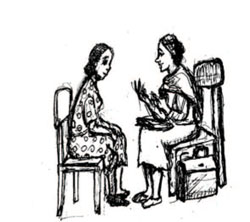6.7 Care and support for survivors of sexual abuse
Survivors of sexual abuse are persons who have lived through sexual violence. Table 6.2 showed the effects that they might experience as a result of the abuse. Immediately after a violent act there may be physical indicators which show that a girl has just been sexually abused (see Box 6.2).
Box 6.2 Physical indicators of recent sexual abuse in young women
Difficulty in walking or sitting
Torn, stained, or bloody underclothing
Pain or swelling in genital area
Lacerations of the hymen, labia or perineum
Bruises or bleeding in external genitalia, vaginal or anal areas.
As the girl is likely to have washed and changed her clothes before coming to see you, most of these physical signs that could indicate the presence of sexual abuse will not be there. However, if you do suspect GBV, ask in a straightforward way ‘Have you been forced to have sexual intercourse when you did not want it?’ If you say ‘Have you suffered GBV’ the girl may not understand what you mean.
Addressing sexual abuse may seem overwhelming to you, but there are a lot of things you can do. Many adolescents are reluctant to acknowledge a history of abuse. Some of them may only disclose their experience over a period of time. You need to ensure confidentiality and reassure the girl that any course of action will only be taken with her permission. Ensuring confidentiality, listening and asking questions in a non-judgemental way encourages the girl to reveal if there is a history of sexual abuse. If there is, ask whether it is still going on. Does she still have contact with the abuser? How old is he and what is his relationship to her? What is the nature of the abuse? What type of coercion was used?
If she says she was raped, give her emergency contraception if it has been less than 120 hours since the rape occurred. Rape is a medicolegal case. It needs investigation and care at a health centre or hospital. Anyone who has been raped should seek care within five days of the violence so that good quality and strong evidence can be collected for the legal process. A complete medical history and physical examination is needed for every rape case. In addition, evidence collection and laboratory investigation for both the legal process and the provision of medical care is required. Depending on their condition, someone who has been raped may need the following: care for acute injures, psychosocial care and support, prevention of pregnancy after rape through emergency contraception, post-exposure prophylaxis for HIV, prophylaxis for STIs, and a follow-up. You should counsel anyone who has been raped to the best of your ability but if possible refer her to legal or social services that deal with sexual abuse.
Evidence needs to be well recorded and reported to the police. This should be done by a skilled person. For this reason, it is important that you refer a rape case to the nearest health centre or hospital. However, this doesn’t mean that there is nothing you can do about it yourself. In addition to emergency contraception you may be able to give a screen for STIs and a pregnancy test.

Under Ethiopian law, rape is a crime and not only the person who has been raped but also their relatives and any other knowledgeable person has a duty to report it. Therefore, you have a duty to encourage and help them to report the case to the police, in addition to the care and support you give them.
6.6 Your role in preventing gender-based violence
